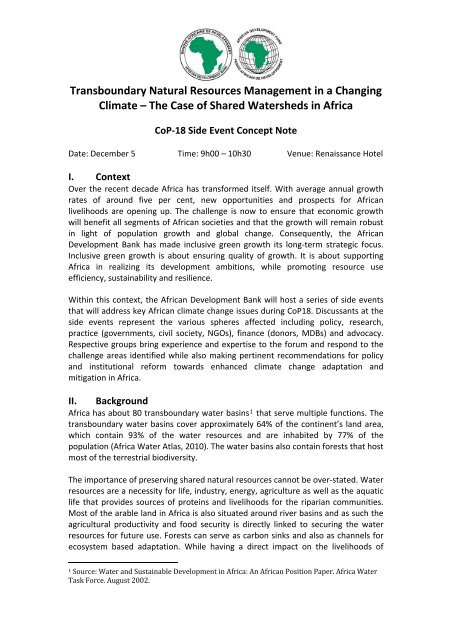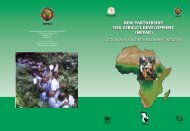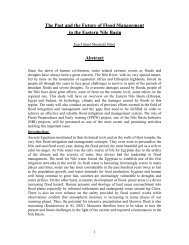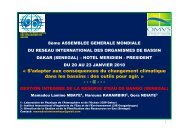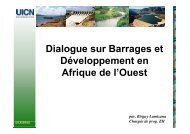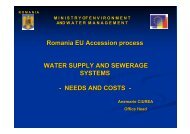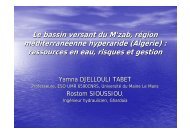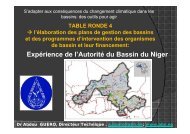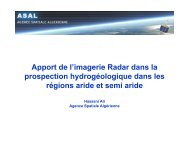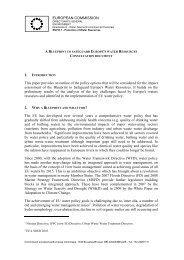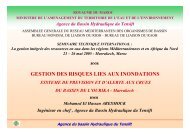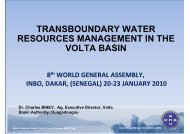Concept note
Concept note
Concept note
Create successful ePaper yourself
Turn your PDF publications into a flip-book with our unique Google optimized e-Paper software.
Transboundary Natural Resources Management in a Changing<br />
Climate – The Case of Shared Watersheds in Africa<br />
CoP‐18 Side Event <strong>Concept</strong> Note<br />
Date: December 5 Time: 9h00 – 10h30 Venue: Renaissance Hotel<br />
I. Context<br />
Over the recent decade Africa has transformed itself. With average annual growth<br />
rates of around five per cent, new opportunities and prospects for African<br />
livelihoods are opening up. The challenge is now to ensure that economic growth<br />
will benefit all segments of African societies and that the growth will remain robust<br />
in light of population growth and global change. Consequently, the African<br />
Development Bank has made inclusive green growth its long‐term strategic focus.<br />
Inclusive green growth is about ensuring quality of growth. It is about supporting<br />
Africa in realizing its development ambitions, while promoting resource use<br />
efficiency, sustainability and resilience.<br />
Within this context, the African Development Bank will host a series of side events<br />
that will address key African climate change issues during CoP18. Discussants at the<br />
side events represent the various spheres affected including policy, research,<br />
practice (governments, civil society, NGOs), finance (donors, MDBs) and advocacy.<br />
Respective groups bring experience and expertise to the forum and respond to the<br />
challenge areas identified while also making pertinent recommendations for policy<br />
and institutional reform towards enhanced climate change adaptation and<br />
mitigation in Africa.<br />
II. Background<br />
Africa has about 80 transboundary water basins 1 that serve multiple functions. The<br />
transboundary water basins cover approximately 64% of the continent’s land area,<br />
which contain 93% of the water resources and are inhabited by 77% of the<br />
population (Africa Water Atlas, 2010). The water basins also contain forests that host<br />
most of the terrestrial biodiversity.<br />
The importance of preserving shared natural resources cannot be over‐stated. Water<br />
resources are a necessity for life, industry, energy, agriculture as well as the aquatic<br />
life that provides sources of proteins and livelihoods for the riparian communities.<br />
Most of the arable land in Africa is also situated around river basins and as such the<br />
agricultural productivity and food security is directly linked to securing the water<br />
resources for future use. Forests can serve as carbon sinks and also as channels for<br />
ecosystem based adaptation. While having a direct impact on the livelihoods of<br />
1 Source: Water and Sustainable Development in Africa: An African Position Paper. Africa Water<br />
Task Force. August 2002.
forest‐ dependent communities, forests also protect and stabilize watersheds and<br />
soils in addition to maintaining land productivity and reversing land degradation.<br />
Climate change is already impacting Africa’s water resources through recurring<br />
droughts and floods. The increasing drying of some regions contributes to the arid<br />
land area that currently covers 60% of total land in Africa. Droughts are Africa’s<br />
principle natural disasters with over 30% of the population exposed to this<br />
phenomenon. The intermittent floods that affect low lying areas have severe<br />
impacts on the livelihoods of the communities.<br />
Climate change modeling predicts that approximately 20‐30% of the plant and<br />
animal species assessed thus far are likely to be at an increased risk of extinction if<br />
average global temperature increase exceeds 1.5‐2.5 o C (Forests for People, 2011).<br />
The disturbances, expected as a result of increased climate variability and change,<br />
are likely to exceed the normal ranges of variation thus exacerbating tree mortality,<br />
destruction of undergrowth and soil degradation. Other impacts such as the<br />
frequency and intensity of disease outbreaks, wildfires and risks associated with<br />
extreme events will also be exacerbated. The decreased ecosystem services in terms<br />
of water cycle regulation, soil protection and biodiversity conservation will imply<br />
increased social and environmental vulnerability particularly given the natural<br />
resources dependency and poverty levels in Africa. These impacts will be<br />
accentuated in the transboundary forests, which cover approximately 21% of the<br />
African landscape<br />
The increasing water demands in the transboundary rivers and lakes due to<br />
increasing populations, settlement patterns and partly fueled by the recent so‐called<br />
‘land grab’ also poses risks for loss of biodiversity and diminished ecosystem<br />
services. Transboundary forest parks are witnessing increasing deforestation and<br />
biodiversity losses. The destruction of mangroves is threatening the sustainable<br />
livelihoods of millions of riverine communities. The recent droughts experienced in<br />
the Horn of Africa and the Sahel also attest to the threat on livelihoods presented by<br />
climatic events and the reduced ability to cope with consecutive dry years as a result<br />
of reduced recovery time between the events.<br />
The existing challenges to the management of transboundary natural resources will<br />
undoubtedly be exacerbated by climate change. The variability in river flows, erratic<br />
precipitation levels, increasing temperatures and sea level rise will impact the<br />
sustainable use of these resources. Africa has a low adaptive capacity to climate<br />
change as a result of relatively high poverty rates, a high dependence on natural<br />
resources for economic stability and a deteriorating natural asset base. Given the<br />
low adaptive capacity of Africa, the new and additional risks as a result of increased<br />
climate variability and change are severe challenges for poverty eradication and<br />
overall economic growth.<br />
Significant resources are required to meet some of the challenges presented by a<br />
changing climate and pilot innovative approaches to joint and shared management<br />
of the vital water and forest resources. Such support will reduce the risks to the
ecosystems and also the populations that are directly and indirectly dependent on<br />
these resources. Proactive management will have to be framed within a regional<br />
context, bringing the state actors together to address common issues and also<br />
strengthening the regional institutions such as the existing River Basin and Forest<br />
Conservation Organizations. The frameworks could provide regional strategies for<br />
building climate resilience that can also promote resource benefit sharing.<br />
Several African countries are developing Climate Change strategies that build on the<br />
National Adaptation Plans of Action (NAPAs), which often include priority actions in<br />
the water and forest resources as two of the vulnerable sectors. The actions<br />
identified in the NAPAs and also in the National Appropriate Mitigation Actions<br />
(NAMAs) that are being developed can inform Regional Strategic Programs for<br />
Climate Resilience. The regional approach not only promotes benefit sharing but also<br />
contributes to regional integration with more countries having access to climate<br />
investment resources.<br />
III. Challenges and Opportunities<br />
Challenges<br />
While Africa is relatively well endowed with natural resources, these remain<br />
untapped or/and poorly managed with very little value addition before export.<br />
Despite growing demands on fresh water, overall water withdrawal stands at about<br />
4% in Sub‐Saharan Africa. Two thirds of the African countries have developed less<br />
than 20% of their agriculture production and less than 5% of the cultivated area is<br />
under irrigation in most countries (Africa Water Atlas, 2010).<br />
The low development of infrastructure for improved water access and, sanitation<br />
management, hydropower, irrigation, water storage and flood mitigation continue<br />
to be a major challenge in most African countries. The changes in precipitation<br />
patterns and resulting water distribution will compound the challenges in<br />
infrastructure development.<br />
In the current urbanization of African countries pollution has grown considerably,<br />
impairing water quality, aquatic life, and the health of watersheds. The expansion of<br />
settlements and agriculture production are some of the main causes of deforestation<br />
and forest degradation. Inadequate and unreliable energy supplies also significantly<br />
contribute to the deforestation as populations depend on wood energy. The<br />
deforestation and forest degradation erodes the ecosystem services provided by the<br />
forests and contributes to the emission of greenhouse gases. It also reduces the<br />
carbon sinking capacity. The planning of settlements needs to be improved and<br />
development of agriculture be done in a greener manner.<br />
Existing River Basin and Forest Management Organizations have developed<br />
management strategies but often lack resources for their effective<br />
operationalization and the full integration of Climate Change adaptation and<br />
mitigation measures. Medium to long term funds for climate change adaptation and<br />
mitigation that are predictable and sustainable for the management of<br />
transboundary resources are limited and not readily available to all the actors.
Opportunities<br />
The need to share water resources among riparian states is often a catalyst for<br />
cooperative water management. Africa already has over 90 international water<br />
agreements to cooperatively manage shared resources. These agreements present<br />
opportunities to learn from successes of cooperation. The capacities of the River<br />
Basin Organizations can be enhanced to integrate climate change adaptation and<br />
mitigation measures. Countries with well‐developed water resources management<br />
mechanisms are resilient to climate variability and are able to better manage<br />
projected adverse impacts of climate change.<br />
Cooperation in the management and development of trans‐boundary water<br />
resources is a building block of regional integration. Regional and cross‐sector<br />
adaptation approaches to cope with the negative impacts of climate change have<br />
the potential to strengthen the cooperation to improve the efficiency of water<br />
resources management. This cooperative approach can lead to further collaboration<br />
and possible joint action, beyond water, thereby contributing to regional peace,<br />
stability and integration.<br />
The green growth development pathway provides opportunities for the agriculture<br />
sector development through investments in affordable irrigation technologies,<br />
adopting climate smart agriculture practices and also the breeding and<br />
dissemination of drought tolerant crop varieties.<br />
The inherent variability in inter annual rainfall in Africa has resulted in populations<br />
living in arid and the semi‐arid landscapes developing traditional adaptation<br />
mechanisms that can be enforced and adjusted to new circumstances. The sharing of<br />
experiences among communities particularly those living around transboundary<br />
resources can be encouraged.<br />
Shared water basins in Africa hold tremendous potential for water resource<br />
development that can contribute to climate change resilience. Multipurpose water<br />
storage infrastructure combining hydropower generation, irrigation, flood control,<br />
and water supply could contribute in maximizing regional benefit.<br />
The success of the cooperation lies on the quality of hydro‐meteorological<br />
information. African countries need to recognize hydro‐meteorological information<br />
(e.g. river flow, rainfall data) as public goods to be shared at all levels, managed and<br />
used for sound water resources management in the region.<br />
Improved forest management also provides opportunities of climate change<br />
adaptation and mitigation by reducing erosion and run‐off and also enhancing the<br />
retention of water and providing shade. The vegetative cover provided minimizes<br />
the disruption on slopes and also increases the protection of riparian areas thus<br />
protecting the water quality. Forests can be used to redeem degraded lands while<br />
also increasing the capacity of carbon sequestration.
IV. Event Objectives and Outputs<br />
Objectives<br />
The objective of this session is to take stock of the existing challenges and issues<br />
being faced in transboundary natural resources management within the context of<br />
climate change. The session will provide a platform to share information and lessons<br />
learnt in transboundary resources management, how it could contribute to<br />
mitigation, and also exchange ideas on proactive management of the resources that<br />
will promote regional integration and cooperation among countries.<br />
Outputs<br />
The key outputs of the session will be concrete ideas on proactive transboundary<br />
natural resources management. These ideas can inform the development and design<br />
of future interventions in transboundary natural resources management.<br />
V. Key Questions<br />
The following questions will be addressed by the high level panel:<br />
1. What climate change impacts on transboundary natural resources are we<br />
witnessing now? What are the projected impacts in the future?<br />
2. What are the consequences of inaction today? How can we urge Africa to<br />
proactively address the adverse and unavoidable effects of climate change?<br />
3. What are some of the successful (and unsuccessful) experiences in<br />
transboundary natural resources management from Africa and beyond, in<br />
the face of climate change?<br />
4. How can the sharing of benefits be ensured for all the actors and the local<br />
communities living adjacent to the transboundary resources?<br />
5. How can financing be secured for the proactive management of the shared<br />
resources? What role can the private sector play?<br />
6. What is the role of land use planning in transboundary resources<br />
management considering the capacity of the regulatory authorities?<br />
7. What are the most pressing institutional support actions that your<br />
organization needs, if any??
VI. Participants Roles and Responsibilities<br />
Panelist’s Name Organization/Position Email Phone Number/ Address<br />
Mr Bai Mass Taal Executive Secretary,<br />
African Ministerial<br />
Council On Water<br />
(AMCOW)<br />
baimass1@yahoo.co<br />
m<br />
11 T. Y. Danjuma Street<br />
Asokoro District<br />
FCT‐Abuja<br />
Nigeria<br />
Mr. Richard Eba’a<br />
Atyi,<br />
Regional Coordinator<br />
CIFOR – Central Africa<br />
Region<br />
Email:<br />
cifor.cameroon@cgia<br />
r.org<br />
Tel: 237 2222 7449, 2222 7451<br />
Fax: 237 2222 7450<br />
c/o IITA Humid Forest Ecoregional<br />
Center<br />
B.P. 2008, Yaounde, Cameroon<br />
Dr Ania GROBICKI<br />
Executive Secretary<br />
Global Water<br />
Partnership<br />
Email :<br />
ania.grobicki@gwpfo<br />
rum.org<br />
Drottninggatan 33<br />
SE‐111 51 Stockholm<br />
Sweden<br />
Tel : +46 8 522 126 50<br />
Mobile : +46 70 722 3757<br />
Dr Ravi PRABU<br />
Deputy Director<br />
General‐ Research/<br />
World Agroforestry<br />
Centre (ICRAF)<br />
R.Prabhu@cgiar.org Telephone: +254 20 7224000<br />
Fax: +254 20 7224001<br />
United Nations Avenue, Gigiri<br />
PO Box 30677<br />
Nairobi, 00100, Kenya<br />
Phone: + 254 20 722 4203.<br />
Fax: +254 20 722 4001/4181<br />
Mr Maher SALMAN<br />
Dr Jean‐Marie<br />
Kileshye ONEMA,<br />
Mr. Mohamed<br />
Salem Ould<br />
MERZOUG<br />
Technical Adviser<br />
Land and Water<br />
Division (NRL)<br />
Natural Resources<br />
Management and<br />
Environment<br />
Department (NR)<br />
FAO‐UN<br />
Research Coordinator<br />
and Acting Manager,<br />
WaterNet (Harare)<br />
High Commissioner/<br />
OMVS (Senegal River<br />
Basin Organization)<br />
Maher.Salman@fao.<br />
org<br />
Tel.: +39 06 570 54718<br />
Fax: +39 06 570 56275<br />
Viale delle Terme di Caracalla<br />
00100 Rome, Italy<br />
jmkileshyeonema@waternetonl<br />
ine.org<br />
omvssphc@omvs.org Tél. : (221) 33 859 81 81<br />
Fax : (221) 33 864 01 63<br />
Immeuble OMVS ‐ Fan Bel Air<br />
ROCADE, ‐ BP: 3152, Dakar ;<br />
Sénégal
Mr. Justino VIERA<br />
OMVG Executive<br />
Secretary<br />
Email:<br />
OMVG@omvg.sn<br />
Tel. (221) 8223159<br />
BP 2353 Dakar<br />
Engineer Teferra<br />
Beyene Asfaw<br />
Executive Director/<br />
Nile Basin Initiative<br />
tbeyene@nilebasin.<br />
org<br />
Tel: +256 (417) 705 177 / (414) 321<br />
424<br />
Fax:+256 (414) 320 971 / 320 183 /<br />
323 757<br />
Secretariat (Nile SEC)<br />
P.O Box 192<br />
Entebbe‐ Uganda<br />
Mr Abdirahman<br />
BEILEH/<br />
Mr Serign JALLOW<br />
Moderator:<br />
Professor Albert<br />
WRIGHT<br />
AfDB<br />
OWAS/OSAN Director<br />
Water Advisor; The<br />
father of the Kumasi<br />
KVIP<br />
A.Beileh@afdb.org<br />
S.Jallow@afdb.org<br />
Email:<br />
amwright2@msn.co<br />
m<br />
Tel. 7110 2037<br />
Tel. 7110 2191<br />
VII. Proposed Program<br />
5 min. Introduction/ Welcome <strong>note</strong><br />
Presenters Mr Abdirahman BEILEH/Mr Serign JALLOW;, Director OSAN/ OWAS<br />
(AfDB)<br />
Presentation (6 panelists‐ 5mins each)<br />
30 min. Title of Presentation:<br />
Presenters: Mr Bai Mass TAAL (AMCOW); Mr. Richard Eba’a ATYI (CIFOR); Dr<br />
Ania GROBICKI (GWP); Dr Ravi PRABU (ICRAF); Mr Maher SALMAN (FAO); Dr<br />
Jean‐Marie Kileshye ONEMA (WaterNet)<br />
30 min. Panel Discussion<br />
Moderator: Professor Albert WRIGHT<br />
Panelist: Mr Bai Mass TAAL (AMCOW); Mr. Richard Eba’a ATYI (CIFOR); Dr Ania<br />
GROBICKI (GWP); Dr Ravi PRABU (ICRAF); Mr Maher SALMAN (FAO); Dr Jean‐<br />
Marie Kileshye ONEMA (WaterNet) Mr. Mohamed Salem Ould MERZOUG<br />
(OMVS); Mr. Justino VIERA (OMVG); Engineer Teferra Beyene Asfaw (NBI)<br />
25 min. Exchange with audience


